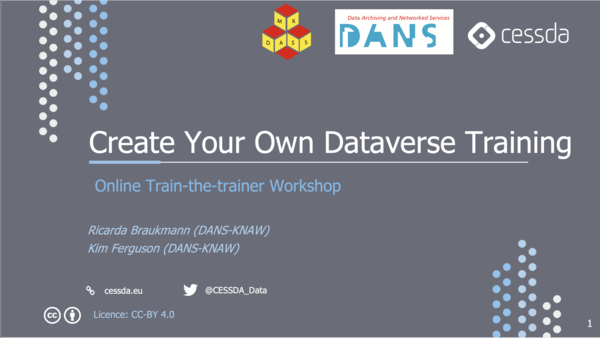
How to use Dataverse for data archiving and discovery
Dataverse is increasingly used as a tool for data archiving and discovery across the world. It offers a unique open-source solution for researchers and institutions to access, preserve, explore and analyse data.
A virtual train-the-trainer event took place on 6 September 2022 with the goal to support further use of Dataverse among the European research community. It was organised by DANS with the support of CESSDA training and MK DASS.
Attendees were data specialists, librarians, data managers and researchers from across Europe. They came from a range of scientific disciplines and had the opportunity to discuss best practices in Dataverse training.
There was a breakout session to work on your own workshop design in small groups, followed by an interactive session on planning and troubleshooting. Attendees discussed common difficulties that arise during events. The event lasted four and a half hours and was facilitated by two trainers: Ricarda Braukmann and Kim Ferguson (DANS).
How can trainers use Dataverse?
The event started with a presentation of the Dataverse project and the open-source research data repository software. Dataverse is developed by Harvard University and used worldwide including by many CESSDA archives.
Attendees had the opportunity to get acquainted with the example training materials and guidelines on the use of Dataverse collected by DANS. These materials were intended to assist the planning and implementation of Dataverse training activities.
Two training outlines were presented: one for using Dataverse in data archiving, and a second for using Dataverse for data discovery. Both outlines were used as templates by participants to work on their own Dataverse training projects.
The practical aspect of the webinar provided valuable input for discussions on the challenges in designing (Dataverse) training activities. Participants discussed possible problems that may arise when implementing training activities as well as practical mitigation measures. Participants were also introduced to a checklist prepared by CESSDA that can help in the planning of (Dataverse) workshops.
A dual outcome
The training event had a dual outcome:
-
A platform – it provided a platform through which prospective Dataverse trainers could exchange best practices in organising training events and
-
Tools – it equipped the attendees with valuable tools intended to assist the design, planning and implementation of Dataverse training events.
The training spurred further interest in Dataverse as a tool for data archiving and discovery. It also improved the knowledge and competence of trainers for conducting local Dataverse training activities.
More information: